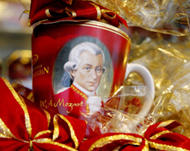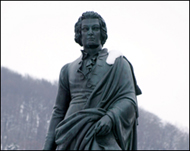Going mad for Amadeus
Austria has been preparing for a jubilee year of concerts and celebrations to mark Wolfgang Amadeus Mozart’s 250th birthday.

In his home town of Salzburg, Amadeus is everywhere, and not just on the usual T-shirts, calendars and coffee mugs.
Shelves are stacked high with bottles of Mozart beer and wine, Mozart baby bottles, Mozart milkshakes, Mozart knickers, Mozart umbrellas and Mozart jigsaw puzzles.
There’s Mozart torte – “a symphony of tastes”, its creator promises – and even Mozartwurst, a sausage of beef, pork and pistachios courtesy of a butcher in Salzburg who claims that the recipe came to him in a dream.
Peter Marboe, an events organiser, said: “There are fears of a possible overkill.”
Complaints of excessive kitsch aside, it is a fitting frenzy of tribute for a musical genius who gave the universe Don Giovanni, The Marriage of Figaro, The Magic Flute, his haunting Requiem and hundreds of other works.
Angelika Kirschschlager, a celebrated Austrian mezzo-soprano, said: “Mozart, for me, is the light I orient my life around. He is a gift from God. [His work] purifies not only the voice but the soul.”
World celebrations
Amadeus aficionados will have hundreds of events from which to choose in New York, Paris, Berlin, London, Prague, Vienna and scores of other cities.
 |
|
There have been complaints of |
On 27 January, the day the composer was born in 1756, New York‘s Metropolitan Opera will present a revival of last season’s new Julie Taymor production of The Magic Flute, and the New York Philharmonic will debut a three-week Magic of Mozart tribute.
But Mozart Central will be Salzburg, where all 22 of his operas will be performed at the Salzburg Festival next summer.
Through the year, Salzburg will host 260 concerts and 55 masses devoted to Mozart’s sacred music.
Millions of tourists
Austria‘s Tourism Ministry expects several million Mozart tourists to converge on the country over the course of the year.
Many will descend on Salzburg, where the house Mozart was born serves as a museum with an eclectic mix of items: a lock of hair, a violin string, mother-of-pearl buttons from his waistcoat, a snuff box, playing cards and notes he scribbled on his many journeys.
 |
|
Amadeus will figure prominently |
There are also more impressive items on display at Getreidegasse N. 9, including the violin he learnt on as a child and a copy of a composition he wrote in 1764 at the age of eight.
Amadeus will figure prominently in virtually every big event in Austria in 2006. Even the Vienna City Marathon has co-opted the composer; along the 42.2km course, costumed musicians will play Mozart sonatas to give the runners a lift.
The classical music world indulged in a similar fit of obsession in 1991 when it marked the 200th anniversary of Mozart’s death. But the sheer scope of the 2006 celebrations has some worrying that it will cheapen his legacy.
Kurt Palms, author of the forthcoming book Wolfgang Is Still Unorthodox, said: “It’s all a bit of an exaggeration. It raises the question of whether one might be causing some damage.”
Child prodigy
Mozart was born as Johannes Chrysostomus Wolfgangus Gottlieb Mozart and christened Johannes Chrysostomus Wolfgangus Theophilus Mozart. The Latin equivalent of Theophilus was Amadeus, and that is how he eventually signed his name.
The epitome of a child prodigy, he started playing the keyboard at three. By his fifth birthday, he was already composing minuets. Between then and 5 December, 1791, when he died of rheumatic fever a few minutes before 1am, he wrote 626 works.
The International Mozarteum Foundation has been using DNA sleuthing techniques to try to determine whether an ancient skull in its possession was that of Mozart.
|
“When you’re happy, a little Mozart will make you happier. And when you’re sad, it will make you sadder still” Peter Marboe, |
So far, the tests have been inconclusive.
Mozart was buried in a pauper’s grave at Vienna‘s St Marx Cemetery, though Otto Biba, a researcher, claims to have evidence suggesting that the composer in his heyday earned today’s equivalent of $45,000 a year.
The spot where experts believe that he was laid to rest is adorned by a simple column and a sad-looking angel.
Marboe, the Vienna events organiser, said: “When you’re happy, a little Mozart will make you happier. And when you’re sad, it will make you sadder still.”